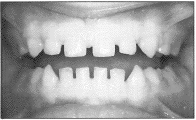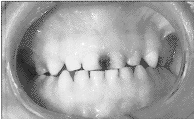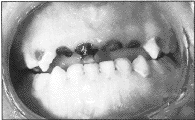|
Dental Care starts in
Womb
|
 Did you know that proper dental care
begins in the womb ? A baby's teeth begin to form six weeks after
conception. Inadequate eating habits by mothers, however, can cause
failure of the tooth enamel to form. This, in turn, can cause your child
to be extremely susceptible to cavity formation. Expectant mothers
should remember to eat a well-balanced diet and consume products which
contain the calcium necessary for proper fetal bone and tooth formation. Did you know that proper dental care
begins in the womb ? A baby's teeth begin to form six weeks after
conception. Inadequate eating habits by mothers, however, can cause
failure of the tooth enamel to form. This, in turn, can cause your child
to be extremely susceptible to cavity formation. Expectant mothers
should remember to eat a well-balanced diet and consume products which
contain the calcium necessary for proper fetal bone and tooth formation.
|
Age to bring in a child.
Most children are brought in to see a dentist between age 3 and
age 4. Younger than that, and they generally will not be able to
sit for the visit. If you can bring the child in with you (if
you are a parent) you can let them see you having your teeth
cleaned and perhaps the dentist can count their teeth and let
them have a pleasant first visit (instead of waiting until they
have a toothache).
|
|
Caring
for your baby's teeth
|
Babies are not born
with cavity causing bacteria. Oral bacteria are transferred from parent to
baby during every day activities such as hugging, kissing, cuddling, and
playing. It's essential for parents to keep meticulous oral hygiene of
their own while waiting for your baby's teeth to erupt.
It is a good habit
to clean your baby's gums after every feeding. This lowers bacteria count
in the baby's mouth and keeps his/her oral environment clean while waiting
for those first two teeth to come in.
Cleaning your baby's
gums is easy. Take a soft piece of cloth or a piece of gauze, dampen it
and gently wipe the gum pads of your baby's mouth. It's also recommended
to not give your baby juices or milk at nap time, especially in a bottle.
Instead, try enforcing water. This helps to avoid future tooth decay.
Fluoride plays an
important role in helping baby's teeth to stay healthy. Fluoride is found
in most city water. Encouraging your baby to drink water is good for their
health as well as their teeth. To find out if your city water is
fluoridated or not, simple call your local water supplier company. Baby's
teeth need fluoride to develop strong healthy and cavity free teeth.
If you are
breast-feeding, your baby is probably not getting enough fluoride to
maintain strong teeth. If this is the case, your pediatrician may
supplement fluoride until the baby is weaned. Fluoride supplement comes in
two forms: one is a fluoride-vitamin tablet and the other is a liquid
droplet that may be added to the bottle. Your pediatrician can determine
how much fluoride supplement your baby will need.
|
Preventing Baby Bottle Tooth
Decay
|
When
your baby gets fussy, do you give the baby a bottle of
milk, fruit juice, or sweetened liquids as a pacifier or
comforter? Do you also give your baby a bottle at naptime
or bedtime? Both of these habits can cause your baby's
teeth to decay.
What is baby bottle tooth decay?
Decay in infants and children is called baby bottle
tooth decay. It can destroy the teeth and most often
occurs in the upper front teeth. But other teeth may also
be affected.
 Healthy
Teeth Healthy
Teeth
 Mild Decay
Mild Decay
 Severe Decay
Severe Decay
What causes baby bottle tooth decay?
Decay occurs when sweetened liquids are given and are
left clinging to an infant's teeth for long periods. Many
sweet liquids cause problems, including milk, formula and
fruit juice. Bacteria in the mouth use these sugars as
food. They then produce acids that attack the teeth. Each
time your child drinks these liquids, acids attack for 20
minutes or longer. After many attacks, the teeth can
decay.
It's not just what you put in your child's bottle that
causes decay, but how often — and for how long a time.
Giving your child a bottle of sweetened liquid many times
a day isn't a good idea. Allowing your child to fall
asleep with a bottle during naps or at night can also harm
the child's teeth.
Why are baby teeth important?
Your child's baby teeth are important. Children need
strong, healthy teeth to chew their food, speak and have a
good-looking smile. Baby teeth also keep a space in the
jaw for the adult teeth. If a baby tooth is lost too
early, the teeth beside it may drift into the empty space.
When it's time for the adult teeth to come in, there may
not be enough room. This can make the teeth crooked or
crowded.
How to prevent baby bottle tooth decay?
Sometimes parents do not realize that a baby's teeth
can decay soon after they appear in the mouth. By the time
decay is noticed, it may be too late to save the teeth.
You can help prevent this from happening to your child by
following the tips below:
- After each feeding, wipe the baby's gums with a
clean damp washcloth or gauze pad. Begin brushing your
child's teeth when the first tooth erupts. Clean and
massage gums in areas that remain toothless, and begin
flossing when all the baby teeth have erupted, usually
by age 2 or 2½.
- Never allow your child to fall asleep with a bottle
containing milk, formula, fruit juice or sweetened
liquids.
- If your child needs a comforter between regular
feedings, at night, or during naps, fill a bottle with
cool water or give the child a clean pacifier
recommended by your dentist or physician. Never give
your child a pacifier dipped in any sweet liquid.
- Avoid filling your child's bottle with liquids such
as sugar water and soft drinks.
- If your local water supply does not contain fluoride
(a substance that helps prevent tooth decay), ask your
dentist how your child should get it.
- Start dental visits by the child's first birthday.
Make visits regularly. If you think your child has
dental problems, take the child to the dentist as soon
as possible.
Photos, Dr. Theodore P. Croll,
Doylestown, PA, Dr. David Johnson, Department of Pediatric
Dentistry, Case Western Reserve University.
|
![]()